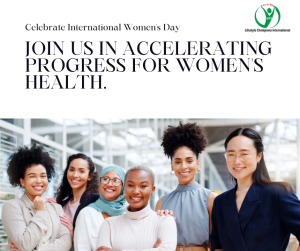Celebrating International Women’s Day: The Healthy Woman
By Ore Taiwo Makinde.
International Women’s Day
The International Women’s Day is another season to celebrate women and girls across the globe. It is a great feeling to know that women are now relevant to the world at large and able to take charge and change the status quo wherever it is needed. The feeling of being needed and accepted is contributing to the health of women worldwide. We need the leading woman to be healthy both physically and emotIonally. It is time to break the bias that undermines the health of both girls and women.

Women are now Everywhere
Women are now seen and heard in the realms of politics, in economic spheres and in social reforms. We have successful women presidents of companies and also of countries. Professional women footballers are no strangers to football courts. We regularly see women train-drivers and bus-drivers. Women are now physicians. It was not always this way, having been relegated to the kitchen and markets in the past.
Discrimination against women
There was a time that women were being turned away from medical schools. Elizabeth Blackwell, the first woman ever in the U.S to earn a medical degree in 1849 faced discrimination in her bid to study Medicine. However, she forged on courageously till she was accepted although the men in the medical school thought they were being pranked with her presence. Another woman pioneer in the field of Medicine is Elizabeth Abimbola Awoliyi. Another Elizabeth. She was the first woman physician practitioner in Nigeria.
A Turn in Centuries
Things have certainly turned a wide berth since the 18th century. But what really makes women healthy and fit to serve in diverse capacities? Is it being free of disease or infirmity? Definitely not, as inferred by the definition of health from the World Health Organisation. Here I will like to summarise what enhances the healthy woman.
- Social acceptance and connectedness: A woman who is socially accepted feels welcomed into her world. Social connectedness is a key driver of well-being and resilience. This helps women confide in others and get advice on important decisions. Women with strong connections are able to take charge of their lives and find quick solutions to problems. Despite women being more likely to be called on to volunteer for “thankless tasks” that benefit organisations but don’t seem to drive promotion, studies suggest that people who volunteer have an improved sense of self-esteem and confidence. This is because volunteering improves social connectedness by building a sense of community.
- Freedom from domestic abuse and violence: Domestic abuse and intimate partner violence occur in a situation where a person wants to gain dominance and control in a close relationship. More often than not, women are the abused partners in relationships and up to 97% of abusers are men with a female partner. Domestic abuse contributes to physical and mental ill-health and can be emotional, economic, social or physical. I have encountered women who lost their babies and in some cases, their eyesight to domestic abuse. Asides from this, abuse leads to fear, feelings of low self-worth, poor self-esteem and reduced performance or productivity at work. It leads to anxiety, post-traumatic stress disorders, depression and increases suicidal tendencies. To be truly healthy and productive, a woman needs to overcome domestic abuse.
- A healthy lifestyle plays a critical role in the health of women. Healthy lifestyles include adequate nutrition, substance avoidance, regular exercise and adequate sleep. Stress coping mechanisms and positive thinking are also part of a healthy lifestyle. However, each of the aforementioned elements require practical, consistent steps to have a long-lasting effect on well-being. Many women are known to care for others without taking much thought for themselves. In order to fuel resilience and improve immunity against acute and chronic illnesses, women must begin to apply self-care principles to their day-to-day lives.
- Financial security. This refers to a status wherein one is at peace with what is needed to overcome one’s expenses. It means economic stability and having what is needed to cover emergencies and other financial goals. This can be enhanced when a woman is encouraged to build a business, own properties and make secure investments. Financial insecurities are known to make an abused woman remain with her abuser despite the threat on her life. However, when a woman is able to work and care for herself, she is able to see a way out of an abusive relationship. Howbeit, financial security is shared by valued partners in a healthy marital relationship. Widows in some cultural settings are often left at the mercy of relatives when they have no tangible source of livelihood.
- Spiritual wellness: This is described as process of seeking meaning and purpose in one’s existence. Healthy women are able to integrate spiritual practices within their everyday life. It also provides them with a sense of appreciation for life, impacts their sense of purpose in life and enables consistency between their values and behaviour.
In conclusion, women play critical roles in the family, in the workplace and in all global spaces. Every woman has the right to feel safe, valued and respected. A healthy woman is worth celebrating on such a day as this when we are all able and wiling to challenge injustice against women, challenge gender inequality, encourage self-care among women and accept the strength of women in the home and society.
Dr Ore Taiwo Makinde is a Consultant Family Physician and board-certified lifestyle Medicine Physician.
